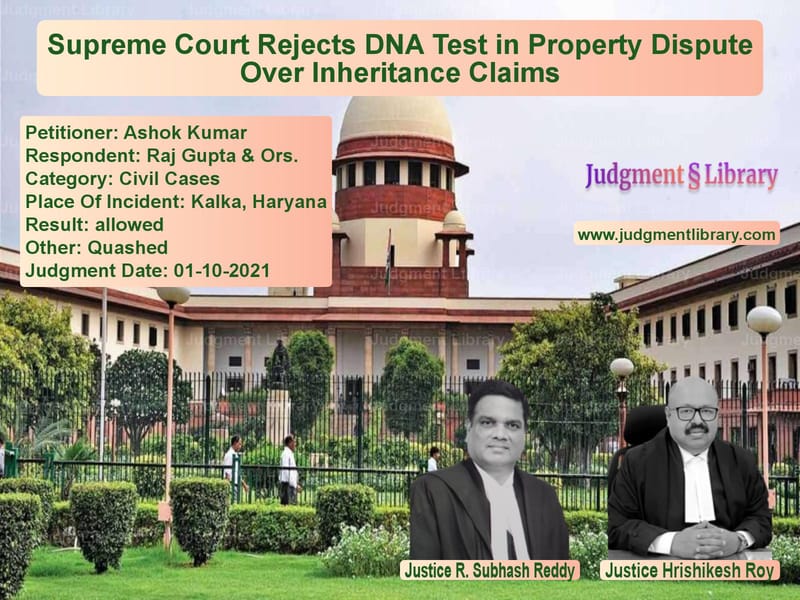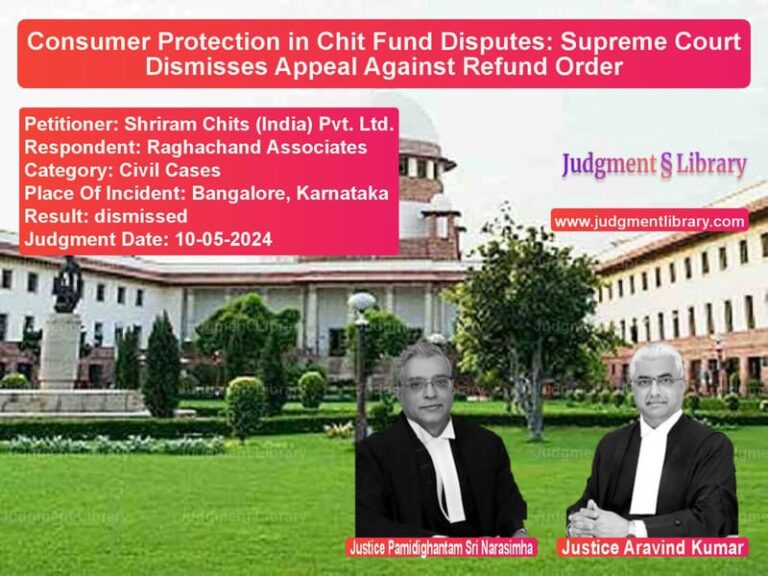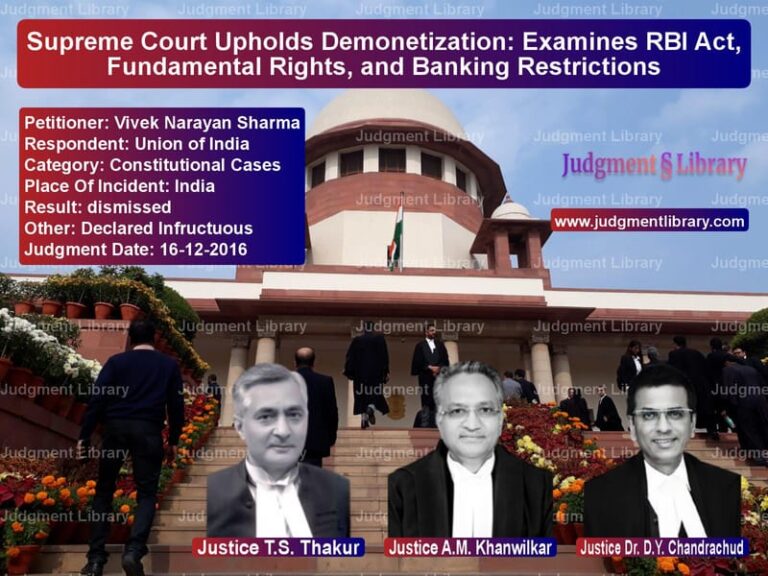Supreme Court Rejects DNA Test in Property Dispute Over Inheritance Claims
The Supreme Court of India recently delivered a significant judgment in Ashok Kumar vs. Raj Gupta & Ors., where the Court ruled against forcing a DNA test in a property inheritance dispute. The case revolved around whether the plaintiff, Ashok Kumar, was the biological son of Trilok Chand Gupta and Sona Devi, making him eligible to inherit their property. The defendants, who were the daughters of the deceased, denied his claim and sought a DNA test to establish the truth. However, the Supreme Court upheld the right to privacy and the sufficiency of documentary evidence, rejecting the need for a DNA test.
Background of the Case
The legal battle began when Ashok Kumar filed a civil suit in 2013 before the Additional Civil Judge (Senior Division), Kalka, seeking a declaration that he was the legal heir of Trilok Chand Gupta and Sona Devi. He asserted his right over their property, which was challenged by the defendants, his supposed sisters, who contended that he was not their biological brother.
The defendants relied on a registered will dated April 16, 1982, which they claimed gave them exclusive rights over the property. They further filed an application demanding that the plaintiff undergo a DNA test to establish his biological relationship with their parents.
Arguments by the Petitioner (Ashok Kumar)
The plaintiff, Ashok Kumar, presented the following arguments:
- Multiple affidavits, including one signed by Sona Devi, his alleged mother, acknowledged him as her son.
- Official documents, such as his school-leaving certificate, ration card, and domicile certificate, listed Trilok Chand Gupta and Sona Devi as his parents.
- The defendants had previously accepted his relationship with their parents and had only raised the DNA test issue after he claimed his share of the property.
- A forced DNA test would infringe upon his fundamental right to privacy, as ruled in previous landmark judgments.
Arguments by the Respondents (Defendants)
The respondents, who were the daughters of the deceased, countered with the following arguments:
- The affidavits produced by the plaintiff were fabricated and could not be relied upon to establish a biological relationship.
- A DNA test was the most conclusive method to determine whether Ashok Kumar was indeed their brother.
- The plaintiff’s claim over the property was fraudulent, as there was no independent proof linking him to their parents.
- Since inheritance rights were being determined, conducting a DNA test was justified in the interest of justice.
Legal Issues Before the Supreme Court
The key legal questions before the Supreme Court were:
- Can a DNA test be ordered solely based on a disputed inheritance claim?
- Does the demand for a DNA test violate the right to privacy of an individual?
- Is documentary evidence sufficient to establish paternity in a civil suit?
Supreme Court’s Judgment
The Supreme Court ruled in favor of Ashok Kumar, rejecting the request for a DNA test. The key observations made by the Court were:
- “A person cannot be compelled to undergo a DNA test unless the need for such a test is established beyond reasonable doubt.”
- The plaintiff had already produced substantial documentary evidence supporting his claim, making the DNA test unnecessary.
- Ordering a DNA test in such cases should be an exception rather than a routine practice, as it could violate an individual’s privacy rights.
- Adverse inference may be drawn from a refusal to undergo a DNA test, but such refusal alone cannot be the sole basis for denying inheritance claims.
The Court relied on previous rulings, including:
- Banarsi Dass vs. Teeku Dutta (2005) – DNA tests should not be ordered unless there is no other means of establishing paternity.
- Bhabani Prasad Jena vs. Orissa State Commission for Women (2010) – Courts must carefully balance privacy rights and the need for truth before compelling a DNA test.
- Dipanwita Roy vs. Ronobroto Roy (2015) – DNA tests should be ordered only when there is no other evidence available.
Impact of the Judgment
This ruling has several important implications:
- It upholds the right to privacy by preventing individuals from being forced to undergo genetic testing without strong justification.
- It emphasizes the importance of documentary evidence in inheritance claims.
- It discourages the routine use of DNA tests in civil litigation unless absolutely necessary.
- It sets a precedent for future cases where paternity and inheritance claims are disputed.
Conclusion
The Supreme Court’s judgment in Ashok Kumar vs. Raj Gupta & Ors. reinforces the principle that DNA tests should not be used as the default method to determine paternity, especially in property disputes. The ruling protects individuals from unnecessary genetic testing and ensures that inheritance claims can be established through reliable documentary evidence. This case serves as a crucial reference for courts dealing with similar issues in the future.
Petitioner Name: Ashok Kumar.Respondent Name: Raj Gupta & Ors..Judgment By: Justice R. Subhash Reddy, Justice Hrishikesh Roy.Place Of Incident: Kalka, Haryana.Judgment Date: 01-10-2021.
Don’t miss out on the full details! Download the complete judgment in PDF format below and gain valuable insights instantly!
Download Judgment: ashok-kumar-vs-raj-gupta-&-ors.-supreme-court-of-india-judgment-dated-01-10-2021.pdf
Directly Download Judgment: Directly download this Judgment
See all petitions in Property Disputes
See all petitions in Succession and Wills
See all petitions in Judgment by R. Subhash Reddy
See all petitions in Judgment by Hrishikesh Roy
See all petitions in allowed
See all petitions in Quashed
See all petitions in supreme court of India judgments October 2021
See all petitions in 2021 judgments
See all posts in Civil Cases Category
See all allowed petitions in Civil Cases Category
See all Dismissed petitions in Civil Cases Category
See all partially allowed petitions in Civil Cases Category







